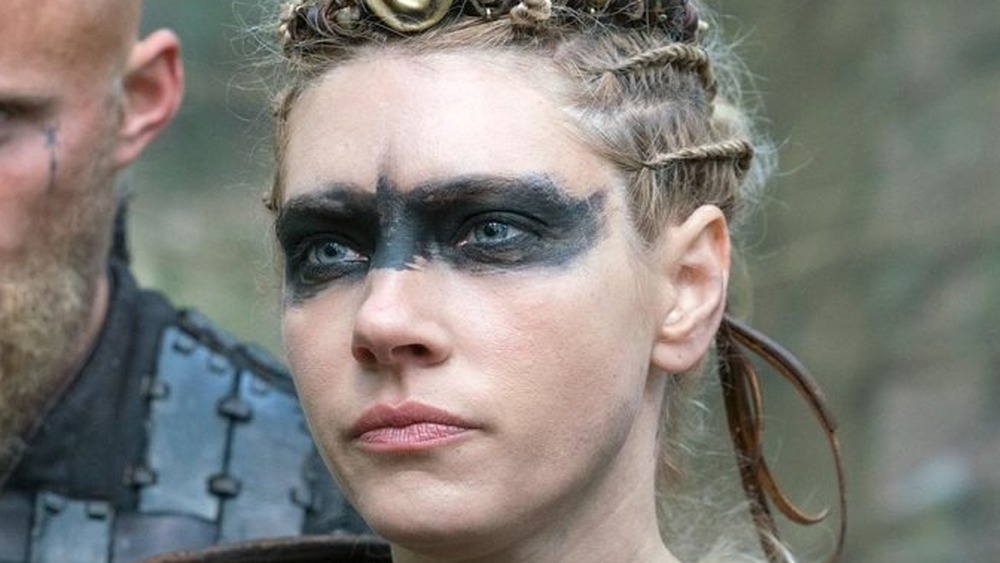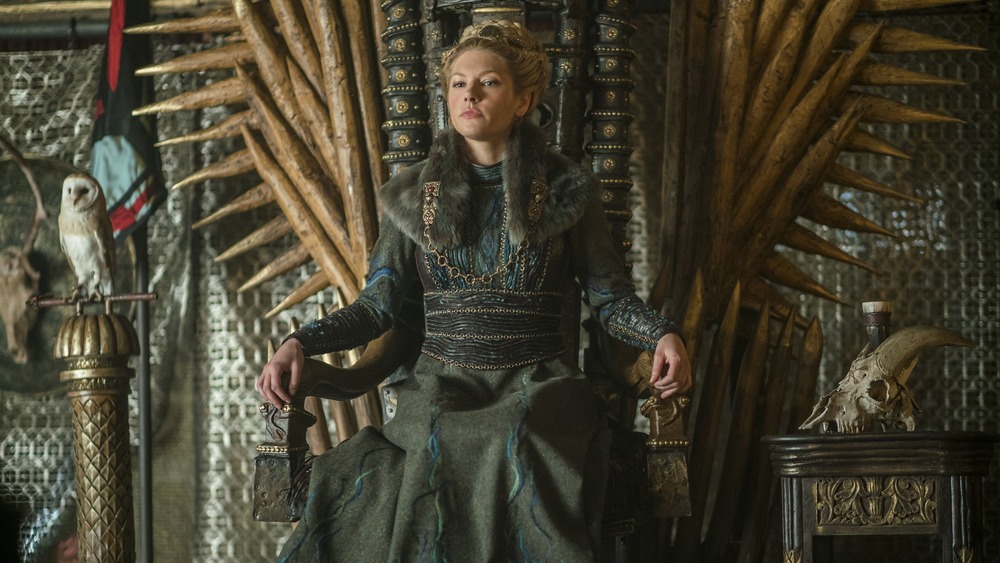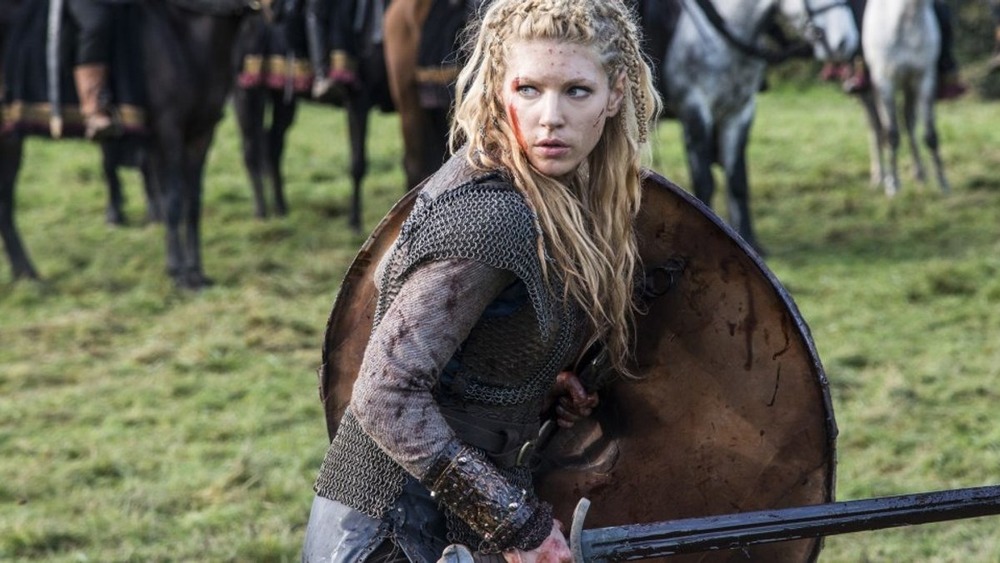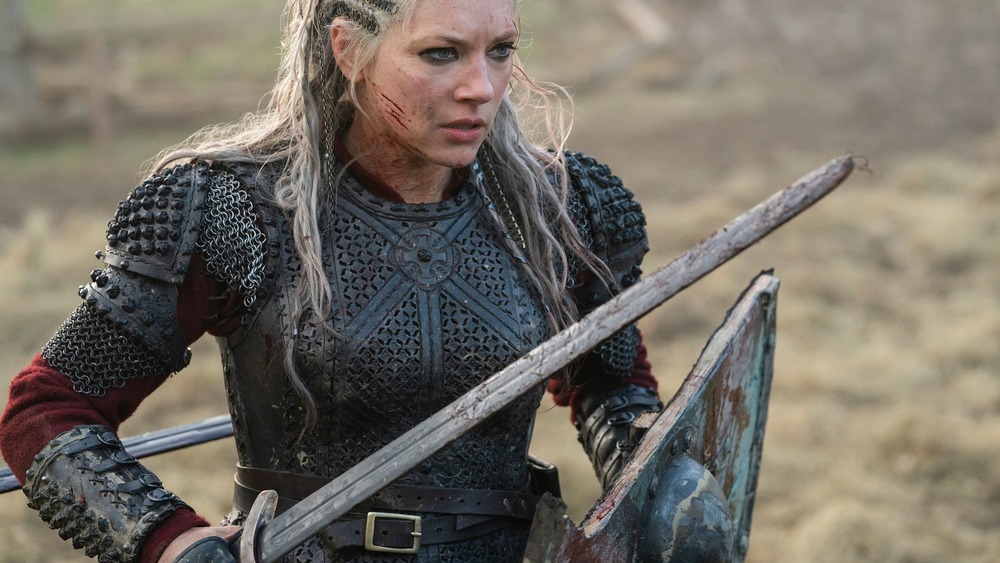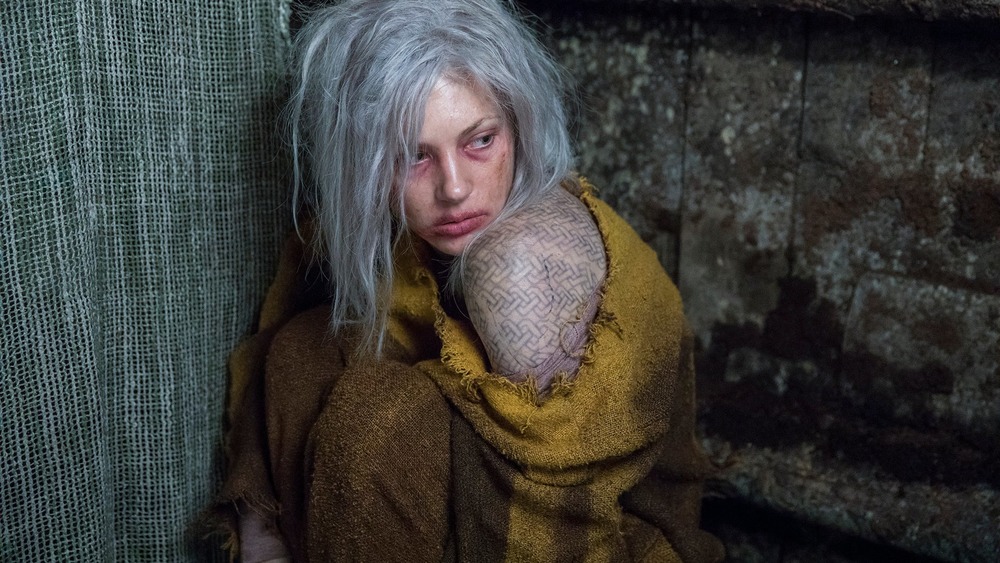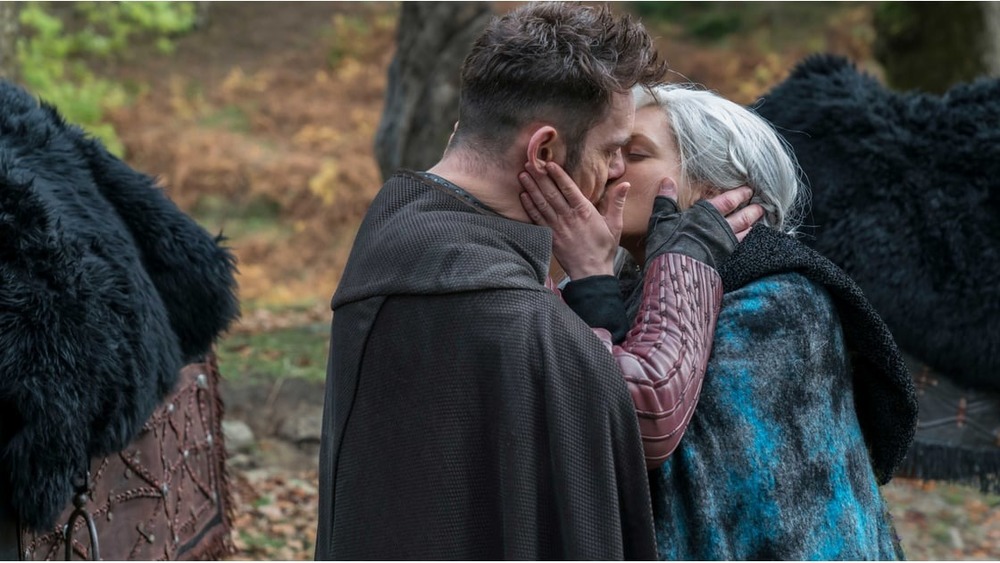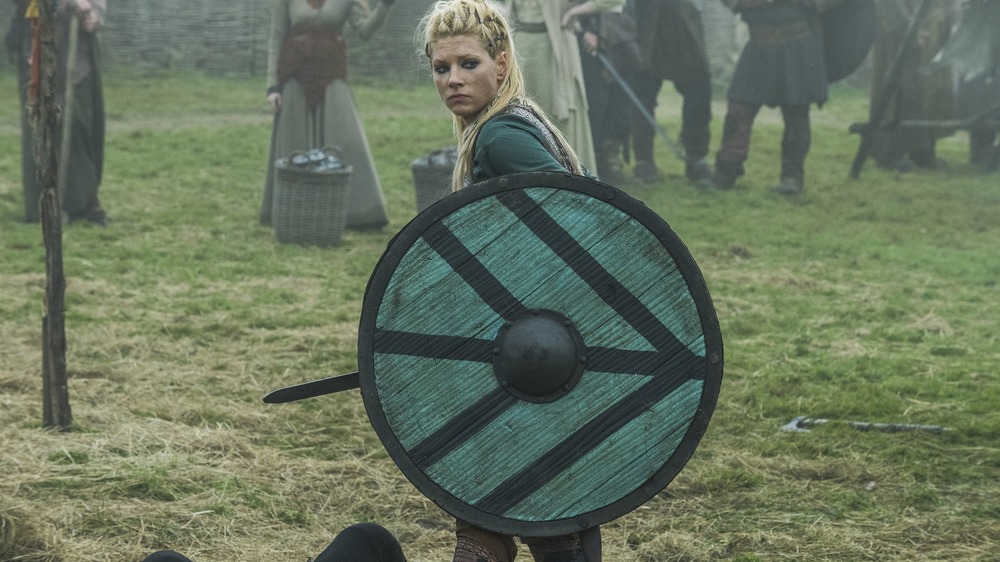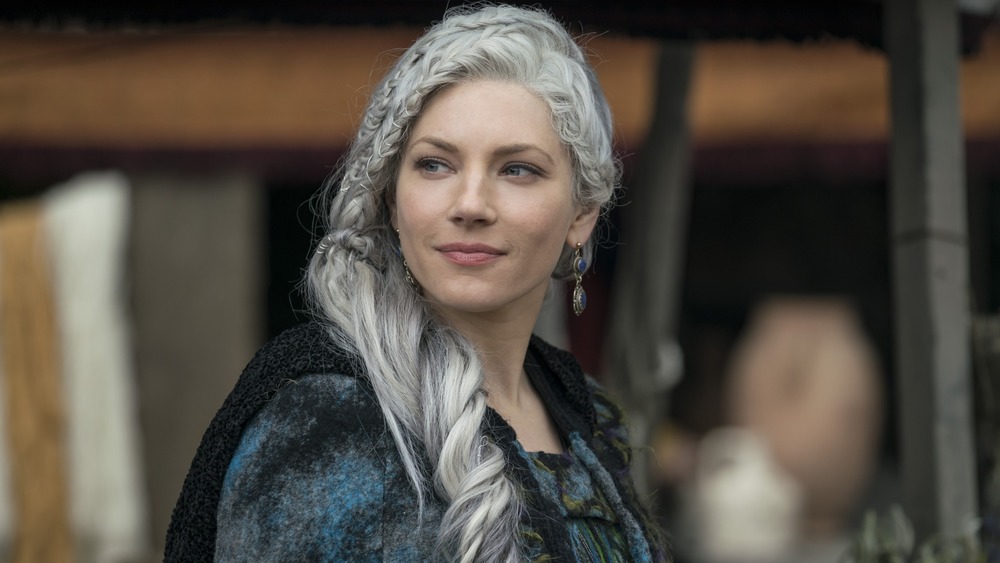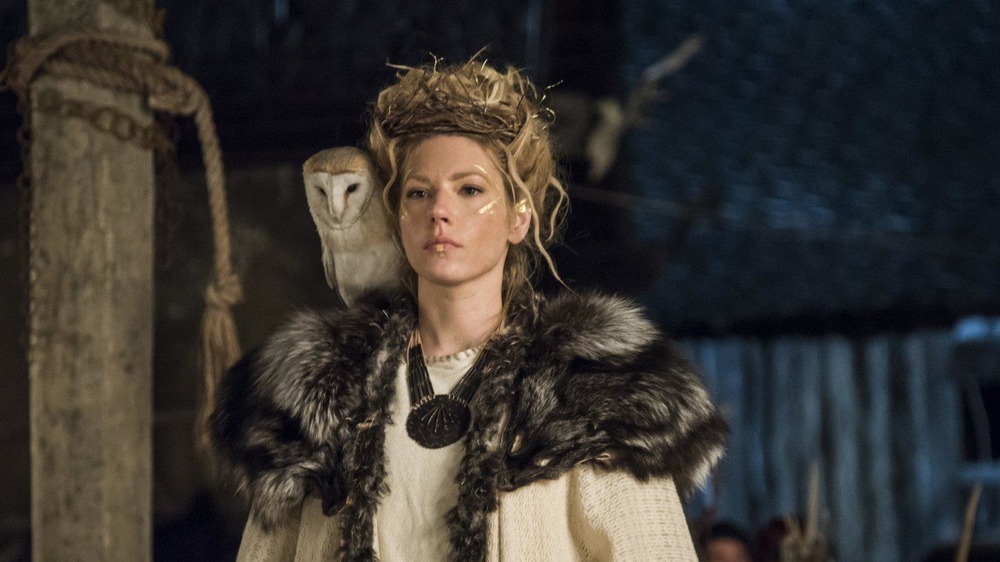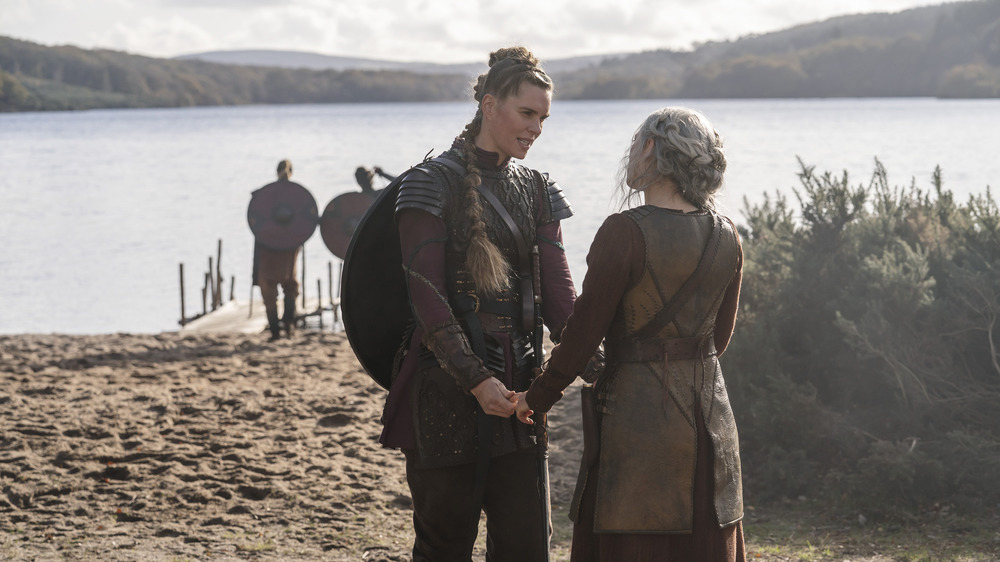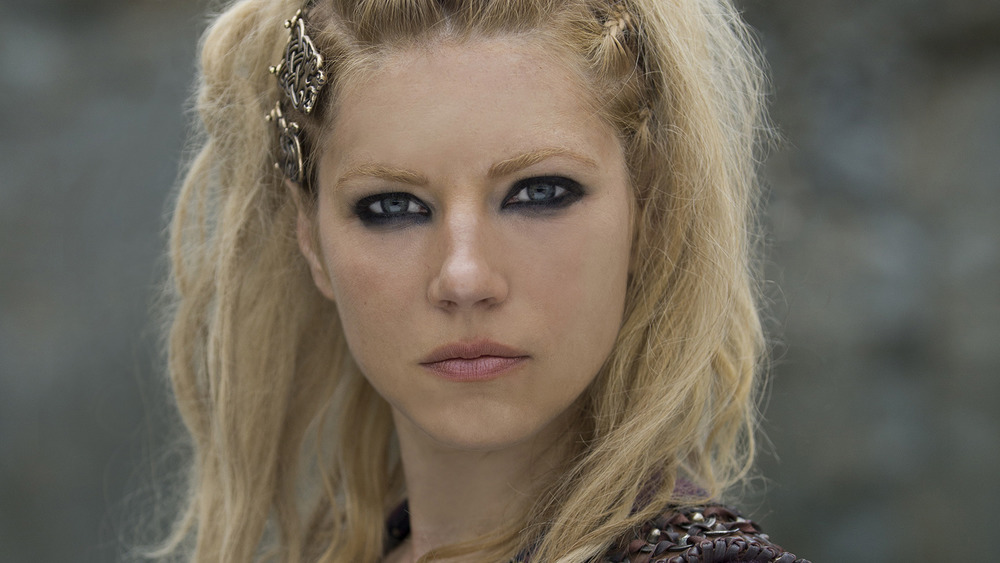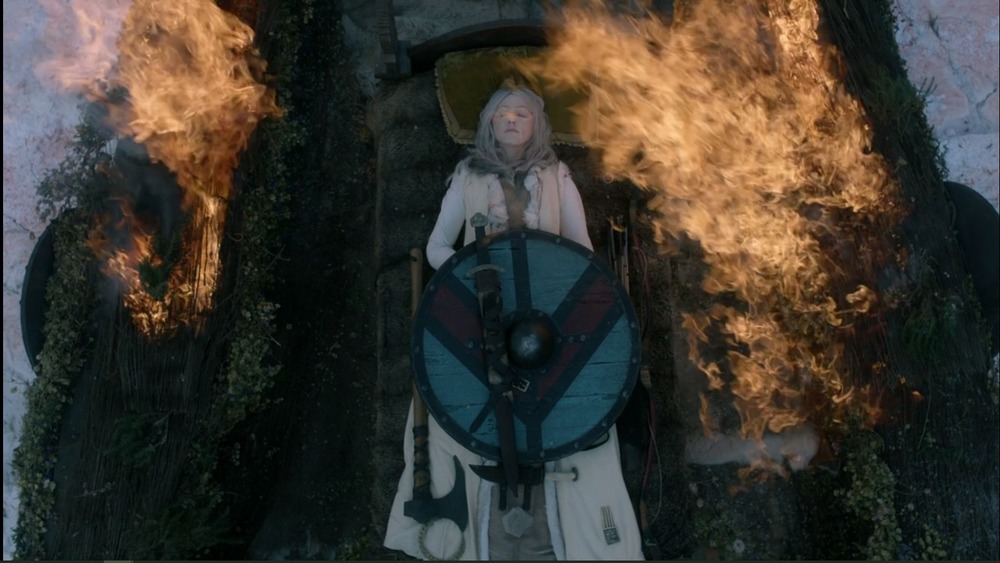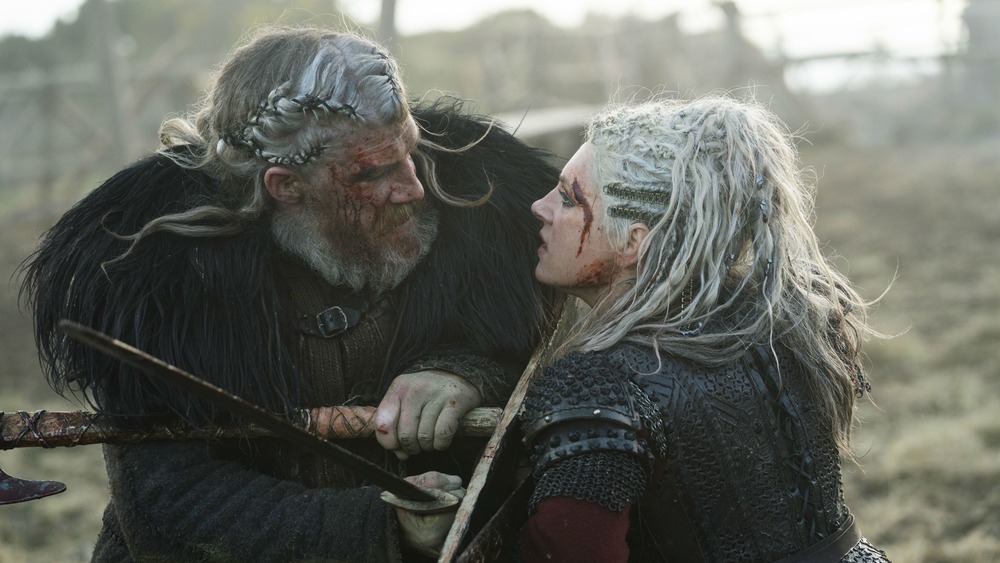Why Lagertha Is The Best Part Of Vikings
At first glance, Vikings seems to be the story of Ragnar Lothbrok and his sons. Yet plenty of viewers would say that it's really the story of Lagertha. She lasts longer within the series, for one thing. Moreover, she touches more lives directly, is part of more battles, has a stronger mind, and even enjoys more romantic trysts than the so-called protagonist. Her fierce determination and skill with a sword and shield also make her the most fun to watch when the steel and blood start flying. And beyond all of this, she steals every scene she's in. No wonder Katheryn Winnick, who plays Lagertha, is one of the few actors to be in every season.
Lagertha opens the series as a rural housewife. But when two men break in and threaten to kill her if she doesn't allow them to have their way with her, she tells them they couldn't kill her if they had a hundred years. She proceeds to all but destroy them without breaking a sweat. She's Lagertha, legendary shield maiden of Kattegat, hero and ruler of all of Norway, a woman admired by everybody for her physical prowess, mental strength, and beauty. From humble beginnings growing up on a farm, she became one of the greatest warriors of her time, as well as an earl and queen in her own right. Lagertha is, in short, the best part of Vikings, and we're here to explain why.
Lagertha is the greatest ruler of Kattegat
Ragnar is a great explorer and a fierce warrior, but he never does take to ruling. Lagertha, on the other hand, takes her responsibilities seriously. Even before she and Ragnar are ruling Kattegat, she is a leader in a raid on England of uniquely strong conviction. When she catches one of her fellow raiders raping an English woman, she stops and kills him, even though it'll make her life more difficult.
Lagertha's list of accomplishments as a ruler is enormous. As leader of Kattegat in Ragnar's stead, we see her settle a marital dispute over paternity with wisdom and grace. As Earl of Hedeby, she goes raiding with Ragnar, and stays in Wessex to hammer out a deal guaranteeing their people farming lands. Her diplomacy with King Ecbert is a bit intimate, perhaps, but tenacious nonetheless. When she becomes queen of Kattegat, she builds up the city's defenses. When she, Ragnar's sons, and seemingly all of Scandinavia go off on their great war of vengeance over Ragnar's death, she personally oversees the human sacrifice instead of having some priest do it. She overcomes King Harald's first attempt to secretly overthrow her, and calmly stops Aslaug's sons from starting trouble when they vow to avenge their mother.
Lagertha is, in short, a good and confident ruler who doesn't back down, but also doesn't escalate tension unnecessarily.
Lagertha is an undefeatable warrior
Ragnar's fierceness in battle is a huge part of his renown, and the same can be said of Lagertha. Early on, Lagertha submits to Rollo because she claims she could never take on such a great warrior, though viewers go on to learn nothing could be further from the truth. In battle after battle, where great Viking, Saxon, and Frankish warriors are felled, she persists and prevails. Who can forget her stealthy and surgical Paris strike? Given the longer amount of time she spends in battle, Lagertha has certainly killed more people than Ragnar by the end of Vikings.
Speaking of endings, her last battle is one of the best. She, a woman well into the twilight of her life, battles a man much larger and more intense than her. After she loses her weapon and her shield is mostly destroyed, she still manages to kill him, earning praise from all, but especially the young Viking warrior Gunnhild. While she may be called a shield "maiden," Lagertha is more exciting and fierce on the battlefield than almost any male warrior. And she is the only Viking warrior leader who is never captured or killed in battle.
Lagertha is true to her sword
There is one thing throughout the whole of Vikings that Lagertha never loses: her sword. She holds the same sword she swung in the beginning of the show during her last fight against White Hair. It's such a part of Lagertha that Winnick actually claimed the sword prop for her own when she left the series.
Kattegat's greatest leader may be many things, but she is a warrior first and foremost. A warrior's weapon is her lifeline. It speaks to Lagertha's pride in her skill as a warrior that she values and carries the same sword with her through her whole life, despite getting her pick of near-countless weapons. She changes outfits, hairstyles, and shield, but never her sword.
Lagertha's character deepens throughout the series, with her utmost commitment to her heritage, her people, her gods, and her traditions gaining particular focus. Along those lines, Lagertha's commitment to her sword echoes her fidelity to the path she has taken. This contrasts sharply with the many Vikings who seem content to thoughtlessly swing whatever they have at hand. In some ways, her sword is her truest, most devoted friend, and she repays the favor.
Lagertha never gives up
Ragnar crumbles under the pressure of ruling, spending many of his days as a leader hiding behind walls, observing. Lagertha rules out in front, constantly establishing and re-establishing her authority, and coming up with plans for whatever city is under her control and protection. When she's forced out of Kattegat by Ivar, alone except for a handful of warriors, she continues to lead them with courage and valor, even as they enter strange waters and alliances. The loss obviously takes its toll and turns her hair white, but she is undaunted.
After her next battle, when she loses her final partner in love, she sinks into madness, much like Ragnar does. Yet unlike Ragnar, she emerges from it composed and reborn, ready to return to Kattegat and serve as an advisor to her son. When her farming community is attacked by bandits, she rides to the rescue of the other villagers and teaches them how to fight, despite the fact that she simply wanted to live as a farmer in near-seclusion. Those villagers do indeed fight, with Lagertha at the lead, despite the fact that doing so comes at great personal cost.
Lagertha's many liaisons
We've long seen powerful men on TV who slake their thirsts with any woman they want — often at the expense of their cast-aside wives. Lagertha turns that role refreshingly on its head in Vikings. She's the great warrior who beds the great figures she comes across, turning the kings and heroes she desires into her lovers. When Harald Finehair asks her to become his wife because he assumes she needs a man to lead, she starts having sex with him and then stops, walking away, leaving him frustrated and sure of who's really in charge.
When she enjoys a fling with King Ecbert of Wessex and he asks her to stay, she rebuffs him. Kalf usurps her earldom in Hedeby while she's gone, and so she feigns a desire for marriage before she kills him for betraying her. She takes up with her beautiful prodigy, Astrid, as kings have long done. She ends her romantic life with Bishop Heahmund, the toughest Saxon fighter for the cross. And of course, there's her first and truest love, Ragnar.
Many societies of the world have seen (and still see) male sexual conquest as a sign of strength and virility, while treating female sexuality as something to be repressed. In Kattegat, Lagertha throws this sexist trope into the fire and becomes the conqueror herself.
Lagertha's symbol means something
Eventually, Lagertha bears her own shield, emblazoned with a special symbol: A straight line with diagonal branches. All leaders in Vikings have their own symbols on their shields in this manner. Ragnar's is a simple red shield that he doesn't even pass on to his followers. King Harald's is a magical Viking symbol akin to a compass (known as the vegvisir) with a simple cross. But Lagertha's symbol means more. On Instagram, Katheryn Winnick explained that Lagertha's shield, carried by her and her subjects, bears a combination of the Viking symbol for a tree and the rune for FE, meaning wealth.
Women have rarely had their own symbols or crests throughout history. Moreover, marriage has historically subsumed women's identities beneath those of their husbands and their families. Yet not only does Lagertha have her own symbol, it has a meaning much deeper than "It looks cool". It is carried into battle proudly by her subjects and shield maidens everywhere.
Lagertha is the least insecure Viking leader
Lagertha has never been worried about saving face, nor does she act to impress others. When Ragnar, the king of all kings in their world, asks her to share him with Aslaug, Lagertha leaves. She will always love him but she refuses to share him. When her next husband abuses her, she kills him. When Ecbert offers her riches if she stays with him, she doesn't let flattery derail her own plans and place as a ruler. Even more, she tells him that while it was fun, he will never love anybody as much as he loves himself. That's not something an insecure leader would say.
In contrast, Ragnar thinks he has failed everybody, and dwells on it to the extent that he makes it true. Harald Finehair enters his quest to be king as a way to prove his worth to a woman — a quest that lasts long beyond the woman in question. Ivar wants to prove he isn't weak. All of Ragnar's sons want to measure up to their father. Everybody is trying to prove something ... except Lagertha, who does not need words of praise nor anybody's affection. She knows who she is and is proud of herself, even after she is "reborn" following her breakdown. Lagertha's internal compass guides her throughout Vikings, which is the sign of a truly secure person.
Lagertha is an owl master
In a land of ravens, Lagertha stands out with an owl perched on her shoulder. In Viking lore, ravens have a reputation for being divine servants of Odin. This meaning, coupled with their land-finding skills, is why Floki carries the birds to Iceland. Lagertha's owl is a very different bird, and in choosing it over the traditional raven (which can also be seen as a spy for Odin, Ragnar's supposed father), she makes an independent move nobody else could pull off.
Not to mention the fact that she makes that owl look cool. Moreover, the creature looks remarkably natural, sitting confidently on her shoulder. In a land of warring ravens, Lagertha is a wise owl. At times, even her gaze is owlish: It's inquisitive, otherworldly, and resolutely inscrutable. Lagertha is the kind of woman who can buck the most stubborn trends and show her strength by changing things up. The pet owl is distinctly hers throughout all of Vikings.
Lagertha never stops passing on her wisdom
Lagertha is always taking women (and occasionally boys) under her wing. Whether it's Torvi, her son's savior and wife, who she makes into one of the greatest warriors of Kattegat, or Astrid, who she trains in the ways of battle and love, Lagertha is continually looking to pass on her skills in battle. She even gives some training to her grandson, Hali. After meeting Gunnhild, the woman who will marry her son, Bjorn, she makes it her personal responsibility to train Gunnhild to be a great warrior queen. The courage she instills fuels Gunnhild's choice to die and be with her dead husband, Bjorn, instead of ruling alongside Harald Finehair.
Lagertha was a farmer in her early years, and wanted to be a farmer again at the end of her life. Yet when the farm community she retires to is attacked, she decides to train and organize her neighbors to fight the raiders. Lagertha passes on her knowledge in warcraft and strategy to help these people defend themselves — but of course, that's always been her way.
Lagertha is strong first, but also beautiful
Ragnar is admired by everybody for his strength, but he is also known as a good-looking man. Along those lines, Lagertha is admired for her fierce skills in battle first, not her good looks. When introduced, she is "Lagertha the shield maiden," not "Lagertha the beauty of Norway." But she is also gorgeous.
We're used to seeing handsome leading men who are chiefly defined as being tough and brave, their looks being a secondary descriptor. Lagertha, similarly, is a woman you would describe first and foremost as fierce. She's not afraid to charge into battle and end up covered in blood, mud, and warpaint. That she is lovely is the afterthought here, as it is for so many male characters but so few female ones. This combination leads to the most powerful and desirable men of Lagertha's time falling in love with her — not only because of her looks, but because she is a fearless warrior who can duke it out with even the most battle-hardened people.
Lagertha inspires (most of) the sons of a woman she killed
When Hvitserk kills Lagertha in a drug-fueled hallucination, he feels sorry and afraid. This is quite a turnaround: All Ubbe, Sigurd, Hvitserk, and especially Ivar speak about in earlier episodes is avenging their mother by killing Lagertha.
As time goes on, Ubbe and Hvitserk recall all they did to try and get their absentee mother to pay attention to them. Sigurd realizes that Aslaug only cared about Ivar. This is why Ivar cares so much about killing Lagertha, right up until the end. A chasm opens between the brothers, as their feelings about their cold mother are conflicted at best — for all but Ivar, anyway.
The other brothers align with and respect Lagertha, just as she has long loved them, if only because they're the children of the man she loves. When she dies, Ubbe says that despite the fact that Lagertha killed his mom, he "can still weep for Lagertha the shield-maiden." And, admittedly with the urging of Torvi and Gunnhild, they put on the most elaborate funeral any character in Vikings receives, complete with a human sacrifice to take Lagertha to Valhalla. Because of her strength and position as warrior queen and mother of all Norway, as well as the respect, honor and love she shared with all her people, even the children of the woman she killed can't help but admire her.
Even in retirement, Lagertha is the toughest person around
Ragnar dreams of returning to the farm. Lagertha actually does it, finishing her life in a farming outpost of Kattegat. Like so many people who carry a heavy burden, she wants to live a simple existence in retirement with her grandkids. And then, the men who her son exiled for crimes committed in service to Ivar start to raid her little village. They hurt the other women, but not her — she could have just let it go. Instead, she takes it upon herself to help the others protect their community. She teaches them how to fight, sets up battle plans, and leads the defense herself.
She ends up fighting White Hair, the leader of the raiders, a massive warrior who had been one of Ivar's top enforcers. He is stronger and angrier than Lagertha, raining down heavy blows that disarm her and break her shield. Yet Lagertha kills him with a shard of that shield by jabbing it into his neck. Gunnhild says it's the greatest thing she's ever seen, and that she will honor Lagertha forever. Even in retirement, Lagertha is still the greatest warrior queen in the land.
